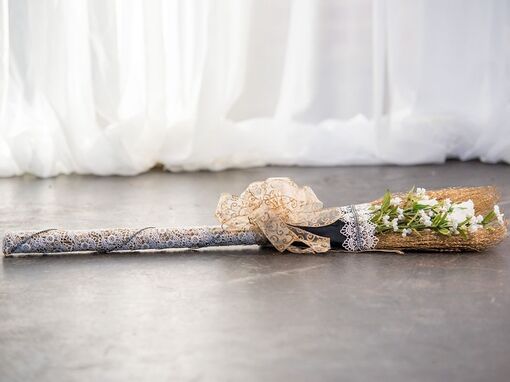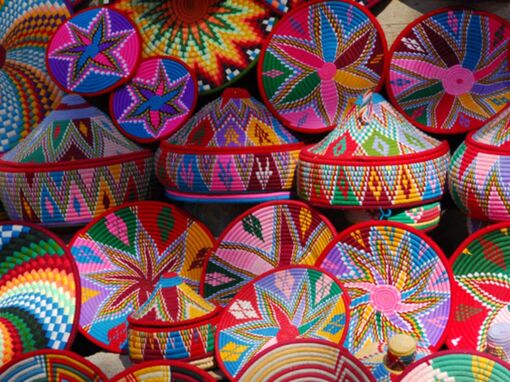
Andre & Fana

Andre & Fana
Tradition

African American Wedding Traditions: The Broom Ceremony
The broom ceremony is a cherished African American wedding tradition that symbolizes sweeping away the past and stepping into a new chapter of life together. With roots in West African culture and a history of adaptation by African ancestors in America, it celebrates resilience, unity, and love.
At the close of the ceremony, the couple jumps over a beautifully decorated broom, marking their commitment to a shared future. This joyful moment, often accompanied by cheers and music, reflects a meaningful blend of heritage and love. This will occur after the "I Do's" during the church ceremony.
In Loving Memory
As we step into this new chapter of our lives, we pause to honor the cherished loved ones who are no longer with us, but whose spirits live on in our hearts.
We remember with love Grover Cleveland Clegg Sr., Andre’s beloved grandfather, whose legacy continues to shape and inspire our family.
We honor the beautiful life of Barbara Broadous, Andre’s dear grandmother, whose grace, strength, and warmth left a lasting imprint on all who knew her.
And we carry with us the spirit of Michael Habtemariam, beloved brother of the bride, whose light, laughter, and love are forever part of who we are.
Though they are not here in the physical sense, we feel their presence all around us—surrounding us with love, blessing this union, and walking with us into the future.

Eritrean Wedding Traditions: A Beautiful Blend of Culture and Celebration
Eritrean weddings are vibrant, meaningful, and steeped in centuries-old traditions. They bring families and communities together to celebrate love and unity. Fana, who is Eritrean, and Andre, who is Black American, want to ensure their guests understand and appreciate Eritrean customs and culture, making their wedding a beautiful fusion of heritage and love. From colorful attire to lively music, Eritrean wedding customs reflect the country’s rich heritage. Here’s an overview of the traditions that make Eritrean weddings unique and unforgettable.
Pre-Wedding Celebrations
Eritrean weddings often involve extensive pre-wedding festivities. One key tradition is the Engagement Ceremony, where families of the bride and groom come together to formalize the union. During this event, elders discuss the couple’s compatibility, and blessings are exchanged. Gifts such as jewelry, traditional clothing, and food may be presented to the bride as a token of goodwill.
Another important pre-wedding ritual is the Hidmo Custom, where women in the family prepare traditional dishes for the celebration. Close friends and family members often gather to share meals, build excitement, and assist with wedding preparations.
Traditional Eritrean Wedding Attire
Eritrean bridal attire is breathtaking and deeply symbolic. Brides typically wear a white dress adorned with gold embroidery, paired with a matching shawl or veil. This outfit reflects purity and elegance. Some brides may also incorporate traditional Habesha kidan, made from soft, handwoven cotton, decorated with intricate patterns along the hem.
Grooms often wear traditional attire as well, such as white or neutral-colored garments with gold accents. Both the bride and groom’s attire showcase the rich cultural heritage of Eritrea.
The Wedding Ceremony
Eritrean wedding ceremonies are usually held in a church or a traditional setting, depending on the couple’s religious beliefs. For Christian weddings, the ceremony is conducted in an Orthodox church, featuring prayers, blessings, and hymns in Ge’ez, the ancient liturgical language of the church. The couple exchanges vows, rings, and receives blessings from the priest.
The Reception: A Festive Celebration
Following the wedding ceremony, Eritrean receptions are joyous and grand. The celebrations can last for days, with music, dancing, and feasting as central elements. Traditional Tigrinya and Tigre music sets the tone, often performed by live bands. Guests join in Shim Shim, a traditional shoulder dance that is lively and engaging.
The food served at the reception is a highlight, showcasing Eritrean cuisine. Dishes such as injera (a sourdough flatbread) and tsebhi dorho (spiced stews) are shared among guests. Suwa, a homemade beer, and Mies, a traditional Eritrean wine, are often served to complement the feast.
Cultural Elements
One iconic feature of an Eritrean wedding is the Kemem Ceremony. During this event, the bride and groom wear traditional garments, including colorful robes, and are celebrated by their families. The elders perform blessings, and symbolic rituals may take place to signify the unity of the couple.
The Zefen Procession is another cherished tradition. This involves a parade of cars or a walk through the neighborhood, where the couple is accompanied by family and friends, all singing and cheering to announce the union.
Post-Wedding Traditions
The celebrations don’t end with the reception. Eritrean couples often participate in a Melse Ceremony, a more intimate gathering held the day after the wedding. The bride and groom wear traditional outfits, and family members share advice, blessings, and good wishes for the couple’s future.
A Union of Families and Cultures
Eritrean weddings are more than just a union of two people—they are a blending of families, communities, and traditions. The rich cultural practices, joyful celebrations, and heartfelt blessings make these weddings an unforgettable experience for all involved.
By embracing these customs, Eritrean couples honor their heritage while creating new memories to last a lifetime.